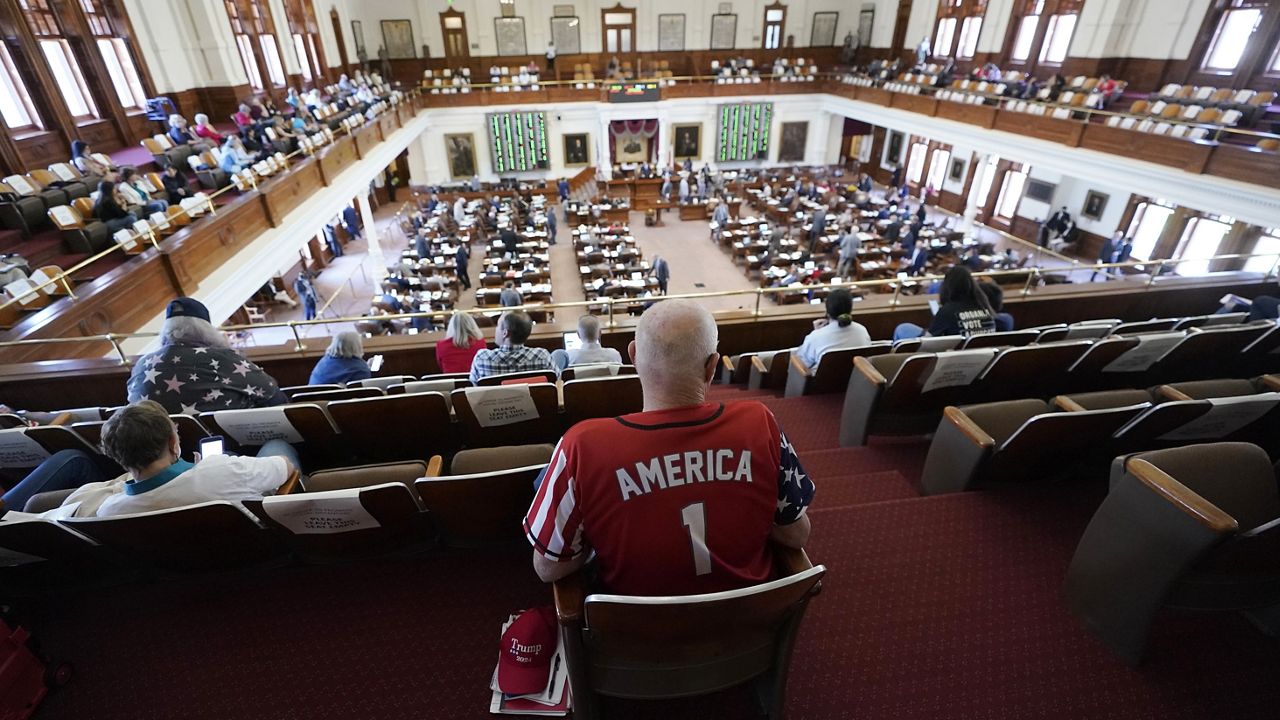As the Biden Administration admonished Florida for enacting a controversial new voting law that opponents say will make it harder for some people to vote, Republican lawmakers in Texas passed a sweeping new elections bill in the early morning hours Friday that would impose a new swath of voting restrictions in the Lone Star State.
At 3 a.m. in the Texas House, following hours of debate between Democrats and Republicans, lawmakers passed the controversial bill in an 81-64 vote.
Democrats, who had little chance of stopping the bill in the Republican-controlled legislature, eventually reached an agreement after lobbing a number of questions at GOP state Rep. Briscoe Cain, the author of the bill, who appeared at times unprepared to answer their queries.
The two parties agreed on 20 amendments that watered down some of the bill’s components, including allowing poll watchers to be removed if they breach the peace, lowering initially proposed enhanced criminal penalties and instructing the state to develop an online format for tracking early ballots and send voter registration information to high schools.
The bill, one of Republican Gov. Greg Abbott’s top priorities, comes as statehouses across the country introduce bills to restrict access to the ballot box in the wake of former President Donald Trump’s false claims about widespread voter fraud in the 2020 election.
There is no evidence of widespread voter fraud in the 2020 election, a statement that has been backed up by a number of officials, including Trump’s own Attorney General William Barr.
There were no problems or fraud reported in Texas, which Trump won in November.
Florida Gov. Ron DeSantis, a Trump ally seen by many as the heir apparent to the Republican Party, signed into law the state’s own voting bill on Thursday, which restricts when ballot drop boxes can be used, introduces strict voter ID requirements and sets limits on who collect peoples’ ballots in an attempt to curb so-called “ballot harvesting.”
“Me signing this bill says: Florida, your vote counts, your vote is going to be cast with integrity and transparency and this is a great place for democracy,” DeSantis said after signing the bill into law.
DeSantis signed the bill live on Fox News, and other news outlets said they were shut out of the event, which led many critics to decry the move as a violation of Florida’s sweeping public disclosure statute, the Sunshine Law.
DeSantis pushed back against those allegations: “It was on national TV. It wasn't secret.”
The White House slammed Florida’s new law on Thursday, saying that the Sunshine State is "moving in the wrong direction"
“The 2020 election was one of the most secure elections in American history,” White House deputy press secretary Karine Jean-Pierre told reporters. “There’s no legitimate reason to change the rules right now to make it harder to vote. That’s built on a lie.”
“The only reason to change the rules right now is if you don’t like who voted, and that should be out of bounds," Jean-Pierre continued, reiterating the White House’s support for H.R. 1, the sweeping law which would widely expand access to the ballot box.
"There’s some states with bad laws trying to make them good,” she added. “And some states with good laws trying to make them even better. That’s moving forward. Florida is moving in the wrong direction.”
According to the Brennan Center for Justice, as of March 24, legislators have introduced 361 bills with restrictive provisions in 47 states, a 43% increase from the month prior.
Other restrictions in the Texas bill would outlaw county officials from sending mail-ballot request forms to all registered voters, efforts voting officials in Harris County — where Cain is from — put in place last year to expand ballot access when in-person gatherings were more hazardous because of the coronavirus pandemic. Harris County, which includes Houston, is also a Democratic stronghold where 44% of the nearly 5 million residents are Latino and 20% are Black.
“We don’t need to wait for bad things to happen to protect the security of the election,” Cain, the bill’s author, said. “I don’t believe that this is voter suppression, I believe it is voter enhancement.”
But voting rights groups say poor and minority voters will bear the brunt of GOP restrictions, and that Republicans are counting on the privilege of their voters to overcome hurdles. On Tuesday, more than 50 companies and business organizations, including some in Texas, released an open letter expressing opposition to “any changes” that would make it harder to vote in that state.
“It is old Jim Crow dressed up in what our colleagues are calling election integrity,” Democratic state Rep. Jessica Gonzalez said.
Republicans in Texas have angrily rejected those accusations. They say the measures would only rein in powers that county leaders never had in the first place.
One Republican in the Texas House, Rep. Lyle Larson, spoke out this week against his party’s proposals in an op-ed in the San Antonio Express-News. But he has been a lone public voice of dissent in his party in the Texas Capitol.
“The suppression tactics included in this bill would hurt the Republican Party as much or more than its opposition,” Larson wrote. “One can only wonder — are the bill authors trying to make it harder for Republican voters to vote?”
The Associated Press contributed to this report.



